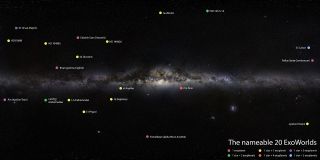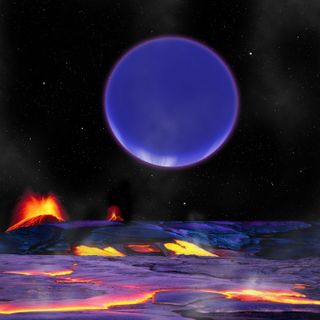
The first official, publicly chosen exoplanet names will be unveiled today.
The International Astronomical Union (IAU) will announce the results of its "Name the Exoworlds" campaign — which asked the public to vote on common monikers for 32 alien planets in 20 different star systems — during a press conference this evening (Aug. 11) at the group's 29th General Assembly in Honolulu, Hawaii.
Scientists who discover exoplanets generally give them names derived from that of the planets' parent stars. The established rubric involves denoting the first planet found in an extrasolar system with the star's name plus the letter "b," the second one with the letter "c," and so on. [The Strangest Alien Planets]
So, for example, the five planets discovered orbiting the star Kepler-186 are known as Kepler-186b, Kepler-186c, Kepler-186d, Kepler-186e and Kepler-186f. The names of the host stars, for their part, are often pulled from catalogues or are taken from the instrument or mission that discovered them (NASA's planet-hunting Kepler Space Telescope in the case of Kepler-186).
Such scientific monikers can be technical and tough to remember, especially for laypeople. There are planets out there, for instance, called HD 104985b and OGLE-2005-BLG-169Lb.
The "Name the Exoworlds" project is an attempt to bring the public into the process a bit, IAU representatives have said. From April through June, astronomy clubs and nonprofit groups submitted common names for the 32 exoplanets and 15 of the 20 host stars (the other five stars already had common names). The public was then invited to vote on the proposed appellations.
The project's 20 exoplanet systems were limited to those discovered in 2008 or earlier, to ensure that they contain confirmed, well-studied planets, IAU representatives said. The systems include some pretty famous alien worlds, including 51 Pegasi b, the first exoplanet ever discovered orbiting a sunlike star. (Astronomers spotted 51 Pegasi b in 1995.)
Get the Space.com Newsletter
Breaking space news, the latest updates on rocket launches, skywatching events and more!
The IAU assigns "official" names to celestial objects and their features. The organization is perhaps best known to nonscientists for its 2006 reclassification of Pluto from "true planet" to "dwarf planet," a decision that remains controversial today.
The IAU has its hands full just keeping up with discoveries made in Earth's solar system. For example, the organization must sift through the many names proposed by team members of NASA's New Horizons and Dawn missions, which are drawing up the first detailed maps of the dwarf planet Pluto and Ceres, respectively.
"Name the Exoworlds" isn't the first project that sought the public's help in giving exoplanets common names.
In 2012, Uwingu — a company founded primarily to fund space research, exploration and education efforts — launched its "Baby Planet Name Book," which charged participants $4.99 to nominate an exoplanet name and 99 cents to vote on a submission. Then, in 2013, the company followed up with a public contest to name Alpha Centauri Bb, an exoplanet spotted in the nearest star system to Earth. (The existence of Alpha Centauri Bb is currently a matter of debate.)

While the Alpha Centauri Bb contest was going on, the IAU issued a press release asserting its authority as the sole arbiter of the exoplanet-naming process and reminding readers that it's not possible to buy an "official" name. Though Uwingu was not mentioned by name, the release seemed aimed at the company's activities.
In an interesting twist, the CEO of Uwingu is Alan Stern, who is also the principal investigator of the New Horizons mission — and a longtime and outspoken critic of the IAU's 2006 reclassification of Pluto.
Scientists have discovered nearly 2,000 alien planets to date, but that number is just the tip of the iceberg. The Kepler spacecraft's observations suggest that each of the Milky Way galaxy's stars hosts at least one planet on average, and many of these worlds may be capable of supporting life.
Follow Mike Wall on Twitter @michaeldwall and Google+. Follow us @Spacedotcom, Facebook or Google+. Originally published on Space.com.
Join our Space Forums to keep talking space on the latest missions, night sky and more! And if you have a news tip, correction or comment, let us know at: community@space.com.

Michael Wall is a Senior Space Writer with Space.com and joined the team in 2010. He primarily covers exoplanets, spaceflight and military space, but has been known to dabble in the space art beat. His book about the search for alien life, "Out There," was published on Nov. 13, 2018. Before becoming a science writer, Michael worked as a herpetologist and wildlife biologist. He has a Ph.D. in evolutionary biology from the University of Sydney, Australia, a bachelor's degree from the University of Arizona, and a graduate certificate in science writing from the University of California, Santa Cruz. To find out what his latest project is, you can follow Michael on Twitter.
